What is it like to work at Moriyama?
An insider view from Marc
I have been coerced into answering the question ‘What's it like working at Moriyama?’
I suspect it’s hard to answer that question publically and not seem like it’s some kind of marketing drivel for recruitment purposes or to inflate the ego of the organisation somehow, but here is my attempt anyhow:
What's it like working at Moriyama?

Like nowhere else I've worked before really is often the answer I give, and that's a good thing and a bad thing too, but the fact that it is ok for me to say this publically is one of the things that is a good thing, because it does tend to be a fairly open and honest environment to work, where people aren't trying to out maneuver people politically all the time and pin the fuck-ups on someone else and generally the focus is on solving the next problem for our clients or building the next useful thing, learning from mistakes not dwelling on them.
Personally, the good things for me are that I'm not stuck doing the same thing over-and-over, my responsibilities stretch between writing and delivering training courses, client management, support and working on development projects, leading and supporting the rest of the staff with my twenty odd years of web development experience - so that's kind of everything.
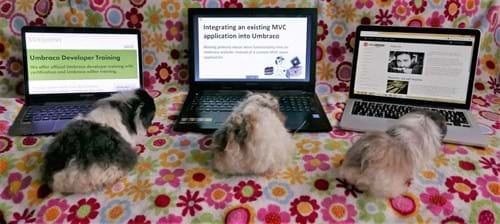
No day is really the same is the cliche, and actually lots of days do feel like they follow the same pattern, but there are variations and quirks that keep things interesting, and Moriyama is always evolving, I’d go as far to say that I’ve worked for at least four different versions of Moriyama over the last few years.
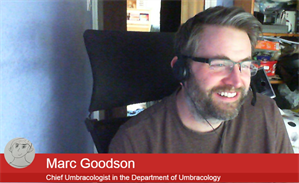
I like working directly with clients to understand the business problem and fathom a solution, and I think it works well not to have to go through a chain of project managers who might not appreciate the nuances of what a client is ‘really saying’ nor reflect technical possibilities back to the client, (or I am just a control freak who just wants to be involved.)
There isn’t really a boss, well not consistently, it’s Darren’s company but the hierarchy is reasonably flat, and maybe just on some days he doesn’t want to be the boss, and he codes, and he’s a techy, but with Thuy somehow makes sure the paperwork and stuff is all done, or he just burns it every night in a bin in his back garden - I don’t know for sure, but we always get paid on time.
What kind of work though?
Support, oh I don't want to do support is the developer mantra, but actually it's really interesting and challenging work...
Our support contracts cover a range of scenarios and situations.
Sites we didn’t build but we somehow keep running and make small improvements too.
Sites we have built and host in Azure
Consultancy with editors and developers working on their own company’s Umbraco site
You learn a lot by getting to the bottom of why something isn’t working as it should in some strange and bizarre set of circumstances, and it improves you as a developer.
It's good because the clients are nice and tend to say thank you.
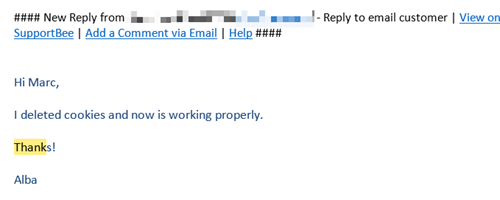
Support then bleeds in consultancy where we provide support to developers working in other companies, they do the work and host the site, but will lean on us for advice of best way to do something or something horrible is happening, help! - which can lead to a screen share and the problem solving brain kicks into action - again people are very nice and tend to say thank you.

Consultancy, we get to visit clients and help advise how teams can best work with Umbraco, from source control and deployment, and great development solutions or just getting developers to talk to each other and to their editorial team.

Training, we train developers and editors on how to get the best out of working with Umbraco, and on these training days, it's good because you get to eat cake and the people are nice and they tend to say thank you.
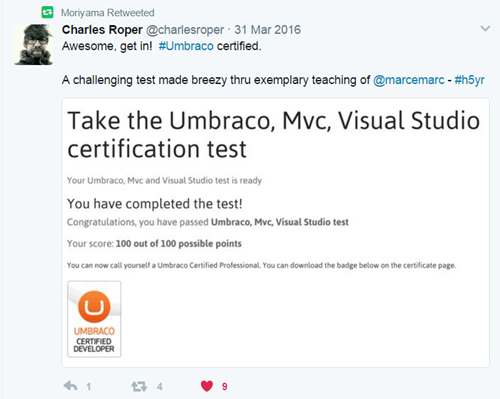
But at Moriyama the thinking is you can't really consult about building best practice Umbraco site's unless you build them yourself...
... so on projects I find myself breaking down client requirements into Umbraco, and designing a back office to deliver a non-painful editor experience…
Last year at the end of a project a client bought me a framed print of the photo I’d used over and over on demos of Umbraco’s cropping blue focal dot which was nice…


and a proportion of our work goes beyond Umbraco, so we're also building custom MVC applications and services to solve interesting niche problems too…
Last year:
-
online realtime forum software
-
student design competition system
On top of that the encouragement is there to blog and build packages, Moriyama is a passionate supporter of the opensource community, look at the packages Moriyama team members have released in the last couple of months:
-
Azure Search for Umbraco
-
Publishing Queue
-
uSpinMeRightRound
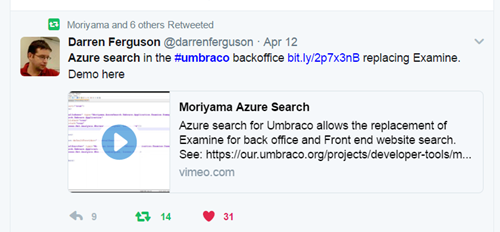
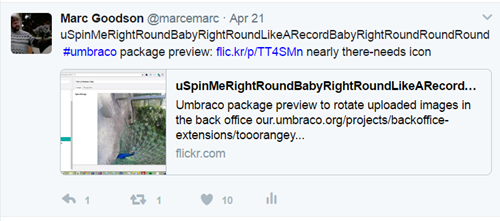
Finally it’s great to be part of the Umbraco community generally:

What is the catch?
So, you work all hours right?
Yes and No, I mean i have the flexibility to work the hours required when I want to work them to get the job done, I manage my own workload and there’s a healthy level of disgust from Darren if you have worked late, or at a weekend… it’s not a long hours hero culture by any means, you are more likely to be called out.
So the pay is lousy?
No, Darren appears to have no idea how to negotiate salaries, and consequently everyone appears to be well paid for their position...
So you'll go bust...
Well, 4 years in and it hasn’t happened yet, we are bustling with work for the next six months and clients seem to like what we do, is it a job for life, who knows.
Ahh, so What do you not like about working at Moriyama ?
Well I work from home, which is ace, and my preference - but you do miss the office rituals of making tea - we chat each morning on google hangouts, and it's easy to call up another staff member to talk about something - but it's not the same. I don't miss the daily commute to the office, but you can feel lonely sometimes, and it's hard to describe what you get from chatting about what you did at the weekend with people sat next to you, but you definitely do miss it.
I like our weekly Friday 'all hands call' that signals the end of the week, and we review what has gone on this week, and what's going to happen next week, and we have 'policy of the week' where we come up with a couple of policies to help move us forward based on what we have learnt... and each year we vote for the policy of the year, and have a plaque made for the London office.
Not being in the office means you can't easily judge someone's mood, you can't tell whether it's a good time (or not) to ask your potentially annoying question...
... working from home DOES make it harder to shut off from your work, but that isn't a Moriyama specific issue for me...
Everyone is quite techie
But we’re not serious all the time…
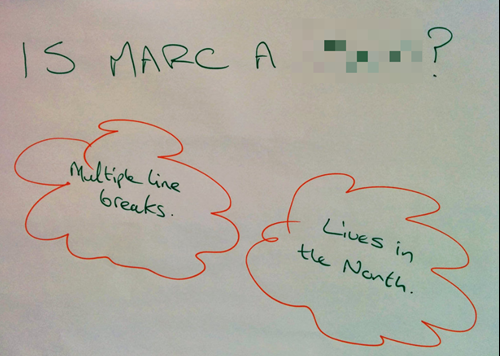
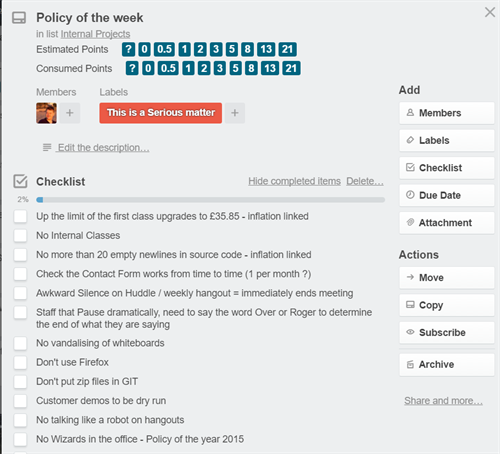


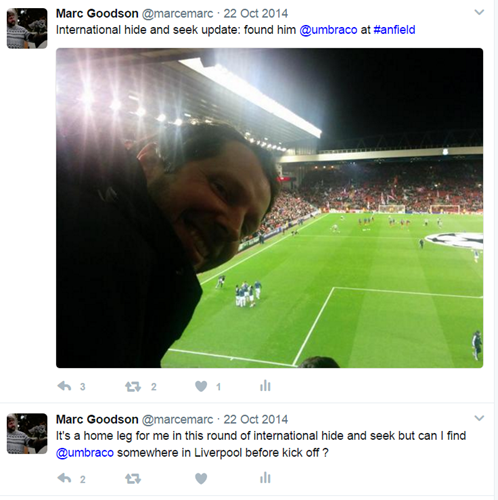
The flexibility and looseness of the organisation structure, can make it feel chaotic, particular for ‘focussed’ techy people who thrive in routine and structure - I’ve adapted quite a bit - the pay-off of working from home far outweighs that for me - but I do have days where I feel a bit lost, question my own sanity, and technical ability - the imposter syndrome, but the nice thing is I can just go out into the back garden and see my chickens, and they always seem to put me straight and help work out any tricky problems.

Not sure if that has answered the question honestly or not, but it is an answer of some sort.